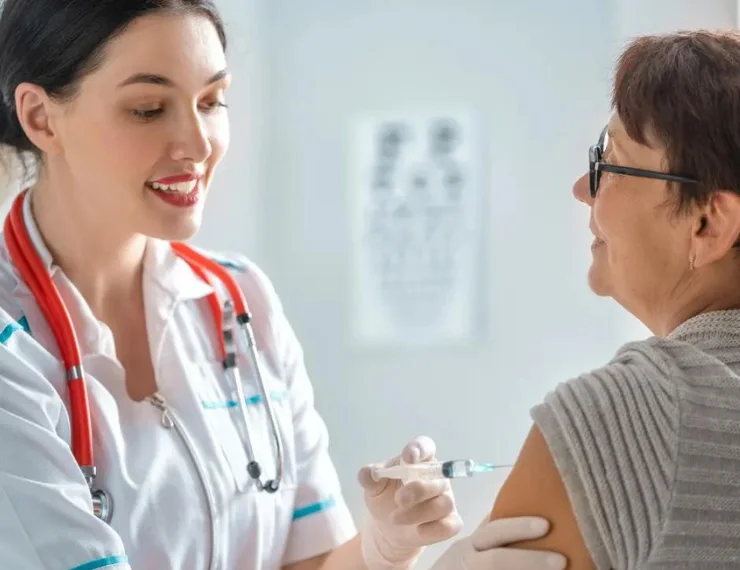
One of the most critical aspects of my role as a primary care physician is to educate and advocate for proactive and preventive care to maximize healthspan. Immunizations are a cornerstone of this. August, recognized as Immunization Awareness Month, provides an excellent opportunity to highlight the importance of vaccines in protecting not only individual health but also public health.
The Importance of Immunizations
Vaccines have transformed modern medicine. They have eradicated smallpox, nearly eliminated polio, and drastically reduced the incidence of diseases like measles, mumps, and rubella. These successes underscore the power of vaccines to prevent serious illnesses and save lives. However, despite their proven efficacy, misconceptions and complacency about vaccines persist.
How Vaccines Work
Vaccines work by mimicking infectious agents such as viruses or bacteria. When administered, they stimulate the immune system to recognize and fight these pathogens without causing the disease. This process creates immunological memory, enabling the body to respond quickly and effectively if exposed to the real pathogen in the future.
Common Misconceptions
- Vaccines Cause Autism: This myth originated from a now-debunked study published in 1998. Extensive research has found no link between vaccines and autism. Vaccines are rigorously tested for safety and effectiveness before approval.
- Natural Immunity Is Better: While natural infection can provide immunity, it often comes at a significant cost. Diseases like COVID, flu, measles and whooping cough can lead to severe complications, hospitalization, or even death. Vaccination provides a safe and controlled way to develop immunity.
- Too Many Vaccines Overload the Immune System: The immune system is robust and capable of handling multiple vaccines. The schedule recommended by health authorities is designed to protect individuals at the earliest and most vulnerable stages of life.
Vaccine Schedule and Recommendations
The Centers for Disease Control and Prevention (CDC) provides comprehensive immunization schedules for different age groups, from infants to older adults, including:
- Infants and Children: Early childhood vaccinations protect against diseases like diphtheria, tetanus, pertussis (DTaP), hepatitis B, polio, and Haemophilus influenzae type b (Hib). The MMR vaccine (measles, mumps, rubella) and varicella (chickenpox) vaccine are also crucial during this period.
- Adolescents: The HPV vaccine is recommended to prevent human papillomavirus, which can lead to cervical and other cancers. The Tdap booster is also advised to maintain immunity against tetanus, diphtheria, and pertussis.
- Adults: Vaccination doesn’t end in childhood. Adults need to stay current with flu shots, Tdap boosters, and vaccines like shingles (zoster) and pneumococcal, which are particularly important for older adults or those with certain health conditions.
The Role of Herd Immunity
Vaccination not only protects the individual but also contributes to herd immunity. When a significant portion of the population is immunized, the spread of contagious diseases is limited, protecting those who cannot be vaccinated, such as infants, pregnant women, or individuals with compromised immune systems.
Special Considerations During the COVID-19 Pandemic
The COVID-19 pandemic has underscored the importance of vaccines in combating infectious diseases. The rapid development and distribution of COVID-19 vaccines have been a testament to scientific innovation and global cooperation. These vaccines have been instrumental in reducing the severity of illness, hospitalizations, and deaths associated with the virus.
During Immunization Awareness Month, it’s essential to remind patients of the ongoing need for COVID-19 vaccinations and boosters to maintain immunity, especially with emerging variants.
The Future of Vaccination
The field of vaccinology is continually evolving. Researchers are developing new vaccines for diseases like HIV, malaria, and even certain types of cancer. Advances in technology, such as mRNA vaccines, have opened new avenues for rapid and effective vaccine development.
In Summary
Immunization Awareness Month serves as a vital reminder of the importance of vaccines in maintaining public health. I urge my patients and the broader community to stay informed, keep up with recommended vaccinations, and engage in open dialogues about vaccine safety and efficacy.
Vaccines are one of the most powerful tools we have to prevent disease and protect our loved ones. By staying up-to-date with immunizations, we contribute to a healthier, safer world for ourselves and future generations. Let’s use this month to recommit to the collective effort of keeping our communities healthy through vaccination.
Read Also: Should We Be Worried About H5N1? What Is It And What Precautions Should We Take At This Time?
Jennifer Abrams, MD, August, 2024
Call The Village Doctor at (650) 851-4747 or Contact us to learn more about the practice.


